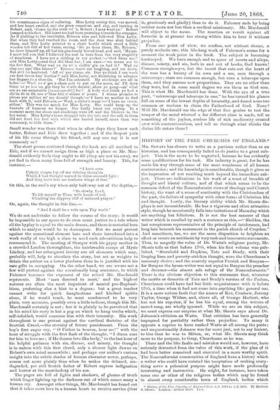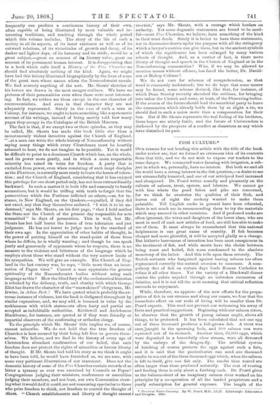HISTORY OF THE FREE CHURCHES OF ENGLAND.*
Mn. SICEATS has chosen to write as a partisan rather than as an historian, and has consequently failed to do justice to a great sub- ject. This is the more to be regretted, because he has evidently some qualifications for his task. His industry is great, for he has made his way through some of the most wearisome of all human controversies ; and his knowledge is considerable, though it gives us the impression of not reaching much beyond the immediate sub- ject. There are indications in his work of a want of breadth of thought and liberal culture, and of that which seems to be the common defect of the Nonconformist views of theology and Church history, the want of a sense of continuity with the Christendom of the past, the failure of sympathy with other forms of Christian life and thought. Lastly, the literary ability which Mr. Skeats dis- plays is not inconsiderable. He has a vigorous and often attractive style, though he occasionally falls into imitations of Macaulay which are anything but felicitous. It is not the best manner of that writer which is recalled by such a sentence as this,—" Sheldon, the last conspicuous representative of the principle of intolerance, had long lain beneath his monument in the parish church of Croydon." And sometimes, too, we see the same disposition to heighten an effect or create an antithesis by very rash and inaccurate statements. Thus, to magnify the value of Dr. Watts's religious poetry, Mr. Skeats tells us that before 1705, when his first volume was pub- lished, " Sternhold and Hopkins, Tate and Brady, with their limping lines and poverty-stricken thought, were the Churchman's necessary choice; and the scarcely superior Patrick and Bunyan- for Bunyan the hymn-writer was not equal to Bunyan the preacher and dreamer—the almost sole refuge of the Nonconformists." There is the obvious objection to this statement that, whatever the merits or demerits of Tate and Brady's version of the Psalms, Churchmen could have had but little acquaintance with it before 1705, a time when it had not come into anything like general use. It is a more serious fault that the names of Ken, Crashaw, Jeremy Taylor, George Wither, and, above all, of George Herbert, who has not his superior, if he has his equal, among the writers of sacred song, are wholly ignored. While we are on this subject, we must express our surprise at what Mr. Skeats says about Dr. Johnson's criticism on Watts. That criticism has been generally impugned for partiality rather than prejudice. To many it appears a caprice to have ranked Watts at all among the poets ; and unquestionably Johnson was far more just, not to say lenient, to him than he was to Milton, or, what Mr. Skeata may think more to the purpose, to Gray, Churchman as he was.
These and the like faults and mistakes would not, however, have seriously detracted from the value of this work, if the plan of it had been better conceived and executed in a more worthy spirit. The Nonconformist communities of England have a history which a writer who could have resisted the temptation of making every- thing serve a polemical purpose might have made profoundly interesting and instructive. He might, for instance, have taken some one or other of the religious bodies which may be found in almost every considerable town of England, bodies which
* History of the Free Churches of England from A.D. 1689 to A.D. 1851. By Herbert S. Shoats. London: Arthur Miall. 1368. frequently can produce a continuous history of their own, often capable of being illustrated by most valuable and in- teresting traditions, and reaching through the whole period which this volume includes. The story of the life of such a society in all its aspects, of its inner existence as well as of its outward relations, of its vicissitudes of growth and decay, of its darker and lighter days, of its harmony and its strife, would be a great subject,—great on account of it literary value, great on account of its permanent human interest. It is disappointing that in a book which calls itself a History of the Free Churches we should find absolutely nothing of the kind. Again, we might have had this history illustrated biographically by the lives of some of the great men whose names adorn the Nonconformist annals. We find scarcely anything of the sort. Mr. Skeats' sketches of his heroes are drawn in the most meagre outlines. 1Ve have no pictures of their personalities even when these were most interest- ing. In fact, we seldom see them except in the one character of controversialists. And even in that character they are not adequately represented. Surely in the case of such a man as Calamy, for instance, we ought to have something like a systematic account of his writings, instead of being merely told how many pages they occupy in the Catalogue of the British Museum.
The fact is that, if we except two or three episodes, as they may be called, Mr. Skeats has made this book little else than a monotonously violent invective against the Church of England.
a man can write the whole history of Nonconformity without saying many things which every Churchman must be heartily ashamed to hear, we do not imagine to be possible. Yet it would be difficult to point to a dominant.Church which has, on the whole, used its power more gently, and in which a more respectable minority has raised its voice for freedom. A party that is excluded from power, even when consisting of such inapt disciples as the Pharisees, is naturally more ready to learn the lesson of tolera- tion; and the Church of England, considering that it has enjoyed this privilege for one short period only, has not been extraordinarily backward. In such a matter it is both idle and unseemly to bandy accusations, but it would be trifling with truth to forget that the persecutions which the Puritans inflicted on others,—as, for in- stance, in New England, on the Quakers,—equalled, if they did not excel, any that they themselves endured. "I wish it to be un- derstood," says Mr. Skeats, on his first page, "that I hold neither the State nor the Church of the present day responsible for acts committed" in days of persecution. This is well, but Mr. Skeats has but half learnt the lesson of true toleration and just judgment. He has not learnt to judge men by the standard of their own age. In the appreciation of other habits of thought, in the power of putting himself on the stand-point of those from whom he differs, he is wholly wanting ; and though he can speak justly and generously of opponents whom he respects, there is no measure to the violence and bitterness of the language which he employs about those who stand without the very narrow limits of his sympathies. We will give an example. The Church of Eng- land in the last century was, he says, "little more than an incar- nation of Pagan vices." Cannot a man appreciate the greater spirituality of the Nonconformist bodies without using such language as this ? How the blind fury of the ecclesiastical historian is rebuked by the delicacy, truth, and charity with which George Eliot has drawn the character of the " unawakened" clergyman, Mr. Irwine, in Adam Bede ! We have quoted what is probably the ex- treme instance of violence, but the book is disfigured throughout by similar expressions, and, we may add, is lessened in value by the recklessness with which statements often hasty and partial are accepted as indubitable authorities. Kettlewell and Archdeacon Blackburne, for instance, are quoted as if they were friendly or impartial observers of the conforming or orthodox clergy.
To the principle which Mr. Skeats' title implies we, of course, cannot subscribe. We do not hold that the true freedom of Churches is best secured by their being left free to govern them- selves. We believe, and we find in the history of every age of Christendom abundant confirmation of our belief, that such freedom does not protect the rights of minorities or favour liberty of thought. If Mr. Skeats bad told his story as we think it ought to have been told, he would have furnished us, we are sure, with some very pertinent illustrations of our 'statement. Does not the domestic history of some of the Free Churches contain records of as bitter a tyranny as ever was exercised by Councils or Popes? Congregations judging their ministers, conferences or assemblies judging their members, and not least, our own Convocation show- ingwhat ib would doif it could, are not reassuring spectacles to those who prize freedom to think, not freedom to control the thought of )thers. "Church establishments and liberty of thought cannot co-exist," says Mr. Skeats, with a courage which borders on audacity. Yet some dogmatic statements are found to be need- ful—most Free Churches, we believe, have something of the kind in their trust deeds. Surely it is better to have these statements, not in documents drawn up for the purpose with all the stringency which a lawyer's caution can give them, but in the ancient symbols of which the significance has been enlarged by many various schools of thought. And, as a matter of fact, is there more liberty of thought and speech in the Church of England or in the Nonconforming communities ? Who, if we may be allowed to mention names without offence, has fared the better, Dr. David- son or Bishop Colenso ?
We do not care for schemes of comprehension, as that word is commonly understood; but we do hope that some means may be found, some scheme devised, like that, for instance, of which Dean Stanley recently sketched the outlines, for bringing into union the Church and some, at least, of the Dissenting bodies. If the events of the future should lead the sacerdotal party to leave the communion which already holds them by so slight a tie, we should find in such a union more than a compensation for their loss. But if Mr. Skeats represents the real feeling of his brethren, these hopes are utterly futile, and the future of Christendom is darkened by the prospects of a conflict as disastrous as any which have disturbed its past.



































 Previous page
Previous page